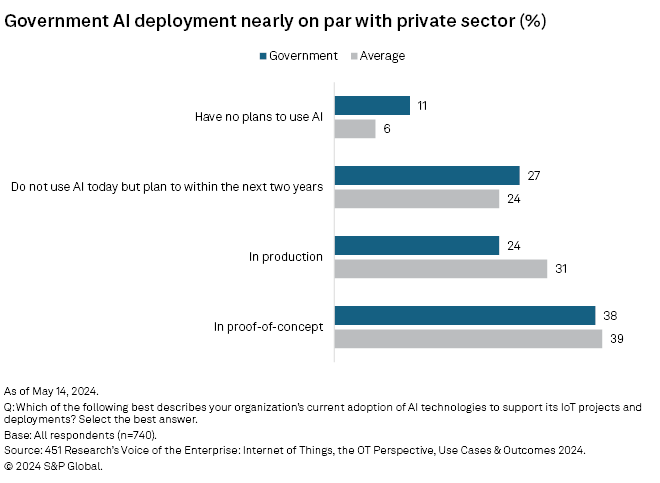S&P Global Offerings
Featured Topics
Featured Products
Events
S&P Global Offerings
Featured Topics
Featured Products
Events
S&P Global Offerings
Featured Topics
Featured Products
Events
S&P Global Offerings
Featured Topics
Featured Products
Events
Corporations
Financial Institutions
Banking & Capital Markets
Economy & Finance
Energy Transition & Sustainability
Technology & Innovation
Podcasts & Newsletters
Corporations
Financial Institutions
Banking & Capital Markets
Economy & Finance
Energy Transition & Sustainability
Technology & Innovation
Podcasts & Newsletters
Research — 5 Jun, 2024

By Zoe Roth
The Smart Cities Connect biannual conference often serves as a barometer for smart-city progress, challenges and private-sector partnerships in the smart-cities space. The Spring 2024 theme, "Innovating with Cities to Create a Better World," highlighted the need for private-public partnerships to ease the deployment and integration of smart infrastructure, open-source tools and AI. At this year's event, cities outlined the current state of their AI efforts, which ranged from policy setting to use-case identification and procurement. They also discussed the key benefits and risks associated with these new tools.

AI has in a way reinvigorated the smart-city movement. AI and generative AI tool availability and functionality have piqued the interest of cities of all sizes across all levels of digital maturity. While this is undoubtedly a unique moment in the smart-cities movement, AI — particularly generative AI — has the potential to further differentiate the technical haves from have-nots. Ensuring tool availability and "explainability" to cities of all sizes will be an essential vendor imperative in maximizing this technology's impact on the public sector. AI projects could also learn from their internet of things counterparts about overcoming the "pilot purgatory" issue by making sure that projects deliver long-term value in services or resource optimization across internal departments where possible.

AI everywhere
At Smart Cities Connect 2024, the potential benefits and risks of AI and generative AI were weighed in discussions around deployments and AI readiness. Much focus was placed on AI standards and guidelines, with public-sector organizations — from cities to airports and departments of transportation — sitting across a spectrum of pragmatic adopters, cautious optimists and restrictive conservatives. Despite some cities being more willing to adopt AI tools in line with their established guidance, Raleigh, NC's chief information officer focused on vendors sharing what was "under the hood" of vendor AI applications. Technical city staff and C-level public-sector leaders are not taking AI for AI's sake, but rather are interested in understanding the AI/machine-learning models, parameters and data sovereignty associated with tools.
Before AI can make the meaningful changes proponents tout (e.g., efficiency, safety and employee productivity), cities will need the aforementioned policies, as well as data governance. Without clean, structured data, AI will not be as effective at analyzing disparate and cross-department data streams, although it could soon get there. The CIO of Tucson, Ariz., implored city leaders to unify employees across departments beyond IT and to remain flexible in response to emerging regulations coming down from the state and federal levels. Our data indicates that government respondents are nearly on par with their private-sector peers in AI proof-of-concept projects, although they lag in production.

Use-case reality check
Before deploying AI and generative AI tooling, cities must set up good data practices, from data collection to ensuring data quality and management. The AI and generative AI use cases mentioned at the conference broadly focus on natural language processing, machine learning and computer vision. While many cities have begun using chatbots to handle some frequently asked questions, they are also crowdsourcing from employees to understand demand for use cases.
The City of Mesa, Ariz., allows employees to experiment with available AI tools and provides a survey to gauge interest and create staff training in line with utilization and interest. For nearly all use cases, speakers cited the importance of having a human in the loop to validate generative AI outputs, and ultimately be responsible for systems if they make mistakes.
– Chatbots. Metros of all sizes are relying on chatbots and natural language processing (NLP) to enhance information availability and service delivery for residents. Tucson has begun work with the University of Arizona to offer residents tier 1 tech support for common issues.
– Computer vision. Many cities have deployed computer vision via work with smart waste management provider Rubicon Technologies Inc. The company's technology, which optimizes trash truck routing and efficiencies, can also serve as a data collector on wheels. Leveraging the trash truck, which navigates citywide each week, Rubicon has worked with the City of Wilson, NC, to identify potholes and repeat trash violations, and provide a supplemental data stream for public awareness.
– Document analysis. This tool, which leverages NLP, can free up city employees' time by parsing massive amounts of text-based information to summarize and provide insight. Raleigh uses NLP to analyze council meeting minutes, procurement documents and infrastructure records to understand the state of its water infrastructure.
– Digital twins. A panel of representatives from NVIDIA Corp., International Business Machines Corp. and the University of Central Florida spoke about the management and deployment of digital twins in the public sector. The Orlando Economic Partnership discussed the region's high-fidelity digital twin, which is moving from a descriptive tool to a more operational one. As for funding, speakers discussed cities' ability to monetize their twin as a service, allowing telcos or utilities to leverage the tool for site optimization and simulations. Over time, the panel said, digital twins should integrate more real-time data and become hyperspecialized in response to users.
Cybersecurity has entered the chat
Cities and public-sector organizations are increasingly finding themselves victims of cyberattacks, with website outages and service network interruptions among the milder material impacts. Beyond managing the integration of IoT and AI applications, cities are also challenged to attract and maintain cybersecurity professionals, according to the chief information security officer of Stealth-ISS Group.
Speakers noted a few key considerations for managing AI-driven smart cities' cybersecurity. Metros should work with vendors to define their AI — from automation to analytics — and always keep a human in the loop to verify data output. As phishing becomes increasingly sophisticated, workforce training can go a long way toward protecting public-sector organizations from cyberattacks. While the threats posed by AI systems were front and center, speakers highlighted the need to protect AI systems themselves with unique cybersecurity tools.
Implications
While many cities are interested in the potential of AI/generative AI tools, just as many or more are still in the preliminary phases of exploring the technology. Several city leaders expressed, in addition to not knowing where to start with deploying technologies like chatbots, issues with funding deployments and wariness about where their data might go once tools are in use. Vendors should be aware that governments are just as willing to adopt AI/generative AI tools as private-sector entities, as long as both parties are willing to commit to long-term partnerships rather than focusing solely on contractual obligations.
This article was published by S&P Global Market Intelligence and not by S&P Global Ratings, which is a separately managed division of S&P Global.
451 Research is a technology research group within S&P Global Market Intelligence. For more about the group, please refer to the 451 Research overview and contact page.